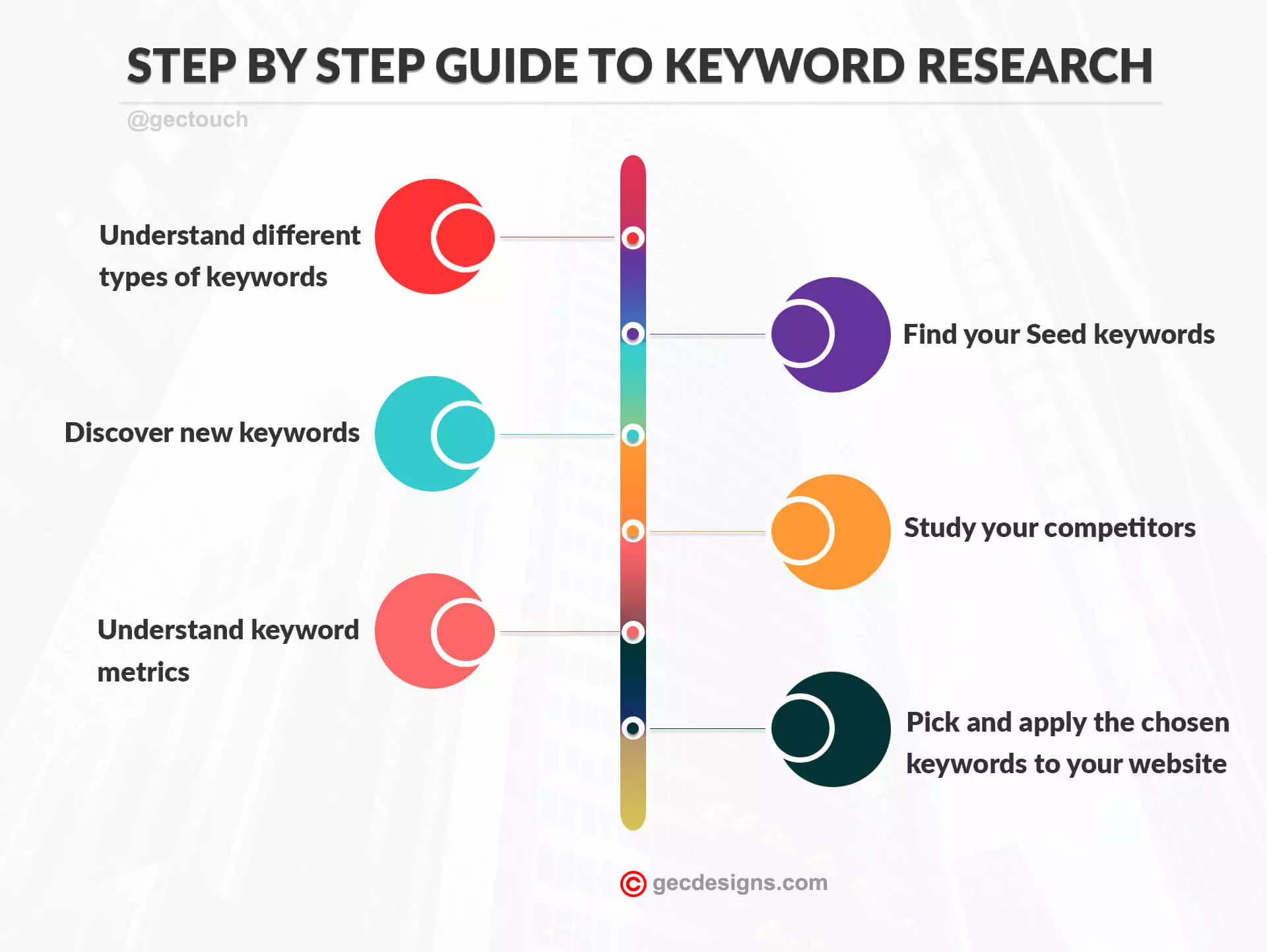Are you struggling to get your website noticed by search engines? Do you feel like your content is lost in the vast sea of the internet? The secret weapon you’re missing might just be effective keyword research. Understanding how to do keyword research for website SEO is crucial for boosting your online presence and driving the right traffic to your site. Imagine your website climbing up the search engine rankings, attracting visitors who are actively searching for what you offer. This isn’t just a dream; it’s a real possibility when you master keyword research. Dive into this guide, and discover the simple yet powerful steps that can transform your website’s SEO strategy. Don’t let your competitors outshine you; equip yourself with the knowledge you need to succeed. Let’s unlock the potential of your website together!

Importance Of Keyword Research
Keyword research is the backbone of any successful SEO strategy. By identifying the right keywords, businesses can understand what their audience is searching for. This insight helps in crafting content that meets user needs. Effective keyword research leads to better visibility on search engines. It helps attract more visitors to your website. This section will explore why keyword research holds so much importance.
Impact On Seo Strategy
Keyword research shapes your entire SEO strategy. It helps in identifying topics your audience cares about. This knowledge guides content creation and optimization efforts. Using relevant keywords improves your website’s ranking on search engines. A well-researched keyword list ensures your site stays relevant and competitive. This strategy increases your chances of being found online.
Driving Targeted Traffic
Keyword research is crucial for driving targeted traffic to your site. By using specific keywords, you reach users who are interested in your content. This means more qualified visitors, leading to higher conversion rates. Targeted traffic results in a better return on your marketing efforts. It helps in achieving your business goals efficiently. Ultimately, keyword research connects you with your ideal audience.
Types Of Keywords
Keyword research is crucial for effective SEO strategy. Identifying the right types of keywords can enhance your website’s visibility. Understanding different categories helps target the right audience. Let’s explore various types of keywords for SEO.
Short-tail Vs Long-tail Keywords
Short-tail keywords are broad and consist of one or two words. They have high search volumes but are competitive. Examples include “shoes” or “laptops”. These keywords attract a wide audience. Long-tail keywords are more specific. They usually contain three or more words. Examples include “men’s running shoes” or “affordable gaming laptops”. These keywords target niche audiences. They often result in higher conversion rates. Long-tail keywords face less competition. They drive more targeted traffic to your website.
Navigational, Informational, And Transactional Keywords
Navigational keywords help users find a specific website. Examples include “Facebook login” or “YouTube homepage”. They indicate a user’s intent to navigate. Informational keywords provide knowledge or answers. Examples are “how to bake a cake” or “what is SEO”. Users search these terms for learning purposes. Transactional keywords indicate purchase intent. Examples include “buy shoes online” or “cheap hotel deals”. These keywords attract users ready to make a purchase. Understanding these types assists in optimizing content effectively.
Tools For Keyword Research
Effective keyword research tools such as Google Keyword Planner and SEMrush help identify relevant keywords for your website. These tools provide insights into search volume, competition, and trends, aiding in optimizing your website’s SEO strategy. Choose keywords wisely to improve visibility and attract the right audience.
When it comes to optimizing your website for search engines, keyword research is your roadmap. It guides your content strategy, ensuring that what you write aligns with what your audience is searching for. The right tools can make this process efficient and effective. Let’s dive into some of the best tools available to streamline your keyword research.
Free Keyword Tools
You don’t need to break the bank to find great keyword research tools. Google’s Keyword Planner is a fantastic starting point. It’s free and offers insights straight from the source of search data. Another excellent tool is Ubersuggest. It provides keyword suggestions, search volume, and even a glimpse into your competitors’ strategies. Don’t overlook Answer the Public. It visualizes search queries in a way that’s both informative and inspiring. Have you ever wondered what questions your audience is asking? This tool gives you those answers.
Paid Keyword Tools
If you’re ready to invest in your SEO strategy, paid tools offer robust features that free versions can’t match. Ahrefs is a powerful choice. It not only shows keyword difficulty but also helps you explore the link profiles of competing websites. SEMrush is another favorite among SEO professionals. It provides in-depth data on keyword ranking trends and competitors’ ad strategies. Moz Pro is worth considering, too. It offers a suite of tools that help you track rankings and analyze potential keywords with precision. Choosing between free and paid tools depends on your needs and budget. What works for you might not work for others, and that’s perfectly fine. The key is to find a tool that helps you understand your audience better and craft content that meets their needs. Which tool will you try first?
Analyzing Keyword Competition
Analyzing keyword competition is a crucial step in the keyword research process. It involves understanding how your chosen keywords stack up against those used by competitors. This analysis helps you identify opportunities where you can rank higher and attract more traffic. Let’s dive into how you can effectively assess competitor keywords and evaluate their difficulty scores.
Assessing Competitor Keywords
To start, make a list of your competitors. Check out their websites to see which keywords they’re targeting. Tools like SEMrush or Ahrefs can be your best friends here.
These tools show you which keywords your competitors are ranking for. Take note of keywords with high search volume and low competition. These might be your golden ticket.
Think about this: Are your competitors missing any keywords that could boost your site? Analyze gaps in their strategy and fill them with your content.
Difficulty Score Evaluation
Keyword difficulty score indicates how hard it is to rank for a specific keyword. Aim for a balance—keywords with high potential but manageable difficulty.
Use tools like Moz or Google Keyword Planner to check these scores. Look for keywords that aren’t too competitive but still bring in decent traffic.
Reflect on your website’s authority. Can you realistically rank for high-difficulty keywords? If not, focus on building your content around moderate-difficulty ones for gradual growth.
By analyzing keyword competition, you arm yourself with the knowledge to make strategic decisions. Are you ready to outperform your competitors by choosing the right keywords?
Finding Keyword Opportunities
Keyword research is the backbone of SEO, steering your website towards the right audience. But how do you find those golden keyword opportunities that can boost your site’s visibility? Let’s dive into some strategic ways to unearth them. By identifying niche markets and tapping into trend and seasonal keywords, you can uncover unique opportunities that might just give you the edge over your competition.
Identifying Niche Markets
To find keyword opportunities, start by identifying niche markets that align with your website’s focus. These are specific, less competitive segments within a broader market. Consider what makes your product or service unique.
Think about your target audience’s specific needs or pain points. What niche markets can you cater to that larger competitors might overlook? Use tools like Google Trends or AnswerThePublic to spot niche interests related to your offerings.
When I launched a blog about sustainable living, I discovered a niche market in eco-friendly pet care. This was an area with growing interest but less competition. By focusing on this niche, I found valuable keyword opportunities that drove targeted traffic to my site.
Trend And Seasonal Keywords
Trend and seasonal keywords can be a goldmine for timely content. Trends are often fleeting but can offer a surge in traffic if tapped at the right time. Seasonal keywords recur annually, offering predictable traffic boosts.
Monitor industry trends using platforms like Google Trends and social media hashtags. This will help you spot emerging topics before they become mainstream. Ask yourself: Which trends align with your brand, and how can you create relevant content quickly?
For seasonal keywords, think about holidays, events, or changing weather patterns that influence your audience’s behavior. I once capitalized on the back-to-school season with a series of blogs on eco-friendly school supplies. The result was a significant uptick in traffic during those months.
By identifying niche markets and leveraging trend and seasonal keywords, you open the door to exciting keyword opportunities. What hidden potential could you uncover for your website today?

Organizing Keywords
Organizing keywords is essential for effective website SEO. Start by identifying relevant terms potential visitors use. Group these keywords by themes to optimize content and improve search engine ranking.
Organizing keywords is a crucial step in optimizing your website for search engines. It helps ensure that your content is relevant and effectively targets the audience you want to reach. By organizing keywords, you can better understand user intent and create content that meets their needs. This not only improves your SEO but also enhances user experience on your site.
Grouping By Intent
When you group keywords by intent, you align your content with what users are actually looking for. Ask yourself: Are they searching for information, looking to buy, or comparing options? By understanding the intent behind keywords, you can create content that answers specific questions or solves particular problems. Consider using tools that provide insight into search intent. They can help you categorize your keywords into informational, navigational, and transactional intents. This way, your content strategy becomes more focused and effective.
Using Keyword Clusters
Keyword clusters are groups of related keywords that revolve around a central topic. They help you cover a subject comprehensively and improve your chances of ranking for multiple search terms. Imagine writing an article on “healthy eating”; related keywords could include “nutritious recipes,” “balanced diet,” and “healthy snacks.” Using keyword clusters allows you to create content that is rich in context and depth. This strategy not only enhances SEO but also makes your content more valuable to readers. Think about how you can use related keywords naturally in your content to provide a holistic view of the topic. Have you ever noticed that some pages rank for multiple keywords? That’s often the result of effective keyword clustering. By adopting this approach, you can maximize the reach and impact of your content.
Using Keywords In Content
Effective keyword research boosts website SEO by identifying terms users search for. Tools like Google Keyword Planner offer insights into popular phrases. Focus on relevance and search volume to select keywords that align with your content.
Using keywords effectively in your content is crucial for boosting your website’s SEO. If you’ve ever wondered why your site isn’t ranking well despite having great content, it might be time to reconsider your keyword strategy. Keywords are more than just words; they’re the bridge between your content and your audience. By using them wisely, you can significantly improve your site’s visibility and drive more traffic.
Optimizing Meta Tags
Meta tags are often overlooked but they hold immense power in SEO. These are snippets of text that describe the content of a page; they don’t appear on the page itself but in the page’s code. Think of meta tags as a brief elevator pitch for your content. They help search engines understand what your page is about. Make sure to include your primary keyword in the meta title and meta description. This makes it easier for search engines to categorize your content correctly. Keep it concise and compelling to encourage clicks.
Integrating Keywords Naturally
Ever read an article where the keywords felt forced or awkward? It’s a common mistake. Keywords should be integrated smoothly into your content, like seasoning in a dish. When writing, focus on the topic first, then weave your keywords in naturally. This ensures your content is readable and engaging. Use keywords in headings, subheadings, and throughout the text. But remember, keyword stuffing can hurt your SEO. Aim for a balance to maintain the flow of your narrative. Have you ever searched for something and clicked on a link only to find the content didn’t match your expectations? This is where naturally integrated keywords shine. They ensure your content aligns with what users are searching for, enhancing user satisfaction. — Incorporating keywords effectively can transform your SEO game. What strategies have you tried and found successful? Share in the comments below!
Monitoring And Adjusting Strategy
Researching keywords is crucial for SEO success. Identify relevant terms your audience searches for. Use tools to find popular keywords. Regularly update your strategy based on trends and performance.
Monitoring and adjusting your keyword strategy is crucial for effective SEO. It’s not a one-time task, but a continuous process. You need to stay agile and responsive to ensure your website remains competitive in search rankings.
Tracking Keyword Performance
To effectively track keyword performance, you should use tools like Google Analytics and Google Search Console. These platforms provide insights on which keywords are driving traffic to your site. Identify the keywords that result in high engagement and conversions. Creating a simple table can help you organize your findings:
| Keyword | Traffic | Conversions |
|---|---|---|
| Example Keyword 1 | 500 | 30 |
| Example Keyword 2 | 300 | 20 |
Regularly review this data. Ask yourself if these keywords align with your goals. If not, it might be time for a change.
Adapting To Changes In Search Trends
Search trends can shift rapidly. Stay informed by following industry news and updates. Tools like Google Trends can help you spot these changes early. Have you noticed a sudden dip in traffic? This could signal a change in trends. Adapt by researching emerging keywords and integrating them into your content. Engage with your audience. What are they searching for now? Use social media or forums to gather insights. This firsthand information can guide your adjustments and keep your strategy fresh. Being proactive rather than reactive can make all the difference in maintaining your site’s visibility. Are you ready to pivot when needed?

Frequently Asked Questions
What Is Keyword Research In Seo?
Keyword research is identifying popular search terms in search engines. It helps in understanding what words your audience uses. This process is crucial for creating relevant content that ranks well. Effective keyword research enhances website visibility and drives organic traffic.
How Do I Start Keyword Research?
Begin by brainstorming relevant topics related to your niche. Use tools like Google Keyword Planner or SEMrush. Identify high-search volume keywords with low competition. Focus on long-tail keywords for better targeting. Analyze competitor keywords for insights and inspiration.
Why Are Long-tail Keywords Important?
Long-tail keywords are specific and less competitive. They attract targeted traffic and have higher conversion rates. These keywords help you rank better in search engine results. Focusing on long-tail keywords can improve your website’s visibility and drive more relevant visitors.
Which Tools Are Best For Keyword Research?
Several tools assist in keyword research, like Google Keyword Planner, SEMrush, and Ahrefs. These tools provide data on search volume, competition, and trends. They help identify the best keywords for your content. Using these tools ensures a data-driven approach to SEO.
Conclusion
Mastering keyword research is vital for effective website SEO. It boosts visibility. Drives traffic. Enhances user engagement. Start with clear goals. Identify your audience. Use reliable tools. Analyze competitors. Choose relevant keywords. Test them. Monitor results. Adjust strategies as needed. Consistent effort pays off. Don’t ignore local search terms. They attract targeted visitors. Keep learning and adapting. SEO trends change. Stay updated. Effective research leads to higher rankings. Improved traffic. Better conversions. Successful websites often rely on strong keyword strategies. Invest time wisely. Your site deserves it.
